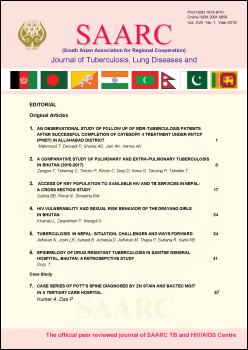Access of Key Population to Available HIV and TB Services in Nepal: A Cross Section Study
DOI:
https://doi.org/10.3126/saarctb.v17i1.25024Keywords:
HIV/TB co-infection, available HIV and TB services, NepalAbstract
Introduction: TB is considered one of the opportunistic infection among PLHIV. The increasing burden of HIV/TB co-infection among key population cause problem to maintain adherence to ART and DOTS services. The emergence of MDR-TB is one of the greatest challenge to control and management of both diseases. However, having knowledge and information of both diseases are important role to access the available HIV/TB services.
Methods: A cross-sectional survey was conducted among key population who had HIV/TB co-infection in two-epidemic zone of Nepal. A pretested semi-structured questionnaire was used to collect data. ANOVA test was done to analyze the collected data by using SPSS version 20.0.
Results: A total of 343 HIV/TB co-infected individuals were enrolled to the study. Most of participants were from ART and DOTS clients. Therefore, the study found that there was significance difference found between knowledge about TB (F=4.400, p= 0.005), causative agent of TB (F=3.160, p=0.025), risk of TB illness among PLHIV (F=8.491, p=0.001) and among key affected population. Moreover, there was significance difference found between access to OI treatment (F=5.113, p=0.002) and access to viral load (F=4.642, p=0.003) among key study population. In gender perspective, there was no significance difference to use and access to available HIV/TB services.
Conclusion: The general knowledge on HIV/TB co-infection was significant association with key population. The knowledge on HIV/TB and access to NGOs’ help can significant effect to access the available HIV and TB services.
Downloads
Published
How to Cite
Issue
Section
License
Copyright © SAARC Tuberculosis and HIV/AIDS Centre (STAC), all rights reserved, no part of this publication may be reproduced, stored in a retrieval system or transmitted in any form or by any means without prior permission of the STAC.





